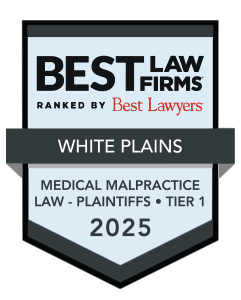How much the personal representative of a deceased person’s estate can sue for in a wrongful death lawsuit will vary case by case. There are various factors considered before a settlement is reached or a jury decides an award.
Extent of Financial Losses
The more extensive the financial and personal losses related to the loss of a loved one, the more compensation you are entitled to in a Yonkers wrongful death attorney. For example:
- Medical bills caused by the accident which led to their death;
- Funeral, cremation, or burial expenses;
- Loss of the victim’s expected income;
- Loss of benefits;
- Estate administration expenses
- Lost inheritance for surviving children;
- 9% interest on top of the damages awarded, calculated from the date of the deceased’s death.
Unfortunately, New York courts do not allow surviving loved ones to recover compensation for their personal pain and suffering, emotional anguish, or “loss of consortium” (the decedent’s companionship, love, care, guidance, etc.).
Pain and Suffering
The deceased’s estate can file a survivorship claim in conjunction with a wrongful death lawsuit to recover damages for the deceased’s pain and suffering prior to death. Therefore, the degree of conscious pain and suffering the deceased endured will be taken into account in a settlement or jury award. However, there must be evidence that the deceased experienced “pre-impact terror,” knowing that death was imminent, and/or experienced “cognitive awareness.” Cognitive awareness means the deceased was conscious after the accident and visibly in pain (e.g., screaming, moaning, or groaning, etc.). When the interval between injury and death is short, proving conscious pain and suffering can be challenging. Additionally, the longer the apprehension or duration of suffering prior to death, the more compensation the estate is entitled to.
Unique Characteristics
The following may also be considered in a settlement offer or jury award:
- The type and severity of the accident.
- The deceased’s age, habits, and occupation.
- The deceased’s health at the time of death.
- The deceased’s life expectancy had they survived.
- The percentage of financial support the spouse relied on.
- Whether the deceased had minor children and how many.
- Whether the deceased was actively involved in their community.
These elements can potentially increase or decrease how much you can sue for in a wrongful death claim. For example, if the victim was young with a family and did not contribute to their accident, the estate may be able to sue for much more compensation.
Punitive Damages
In some cases, punitive damages may also be awarded, which can significantly increase a case’s value. However, they are typically reserved for wrongful death claims involving an at-fault party whose actions were malicious or extremely reckless. Unlike other types of compensation, punitive damages are intended to punish the defendant.
Pure Comparative Negligence
Whether the deceased was partially or entirely at fault for the accident that led to their death can significantly impact how much an estate can sue for. Under New York’s pure comparative negligence law, a victim’s percentage of fault for their accident will reduce a wrongful death settlement or award. For example, if the deceased’s estate is awarded $500,000, but the victim was found 30 percent responsible for their accident, the estate will only receive 70% of the award, or $350,000.
 Because Relationships Matter
Because Relationships Matter 

















